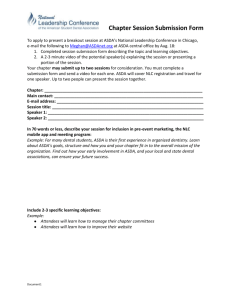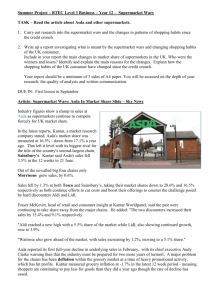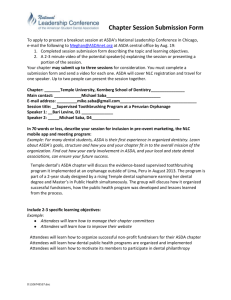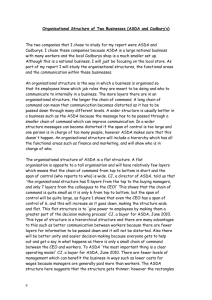Home & Leisure Technical Code of Practice
advertisement
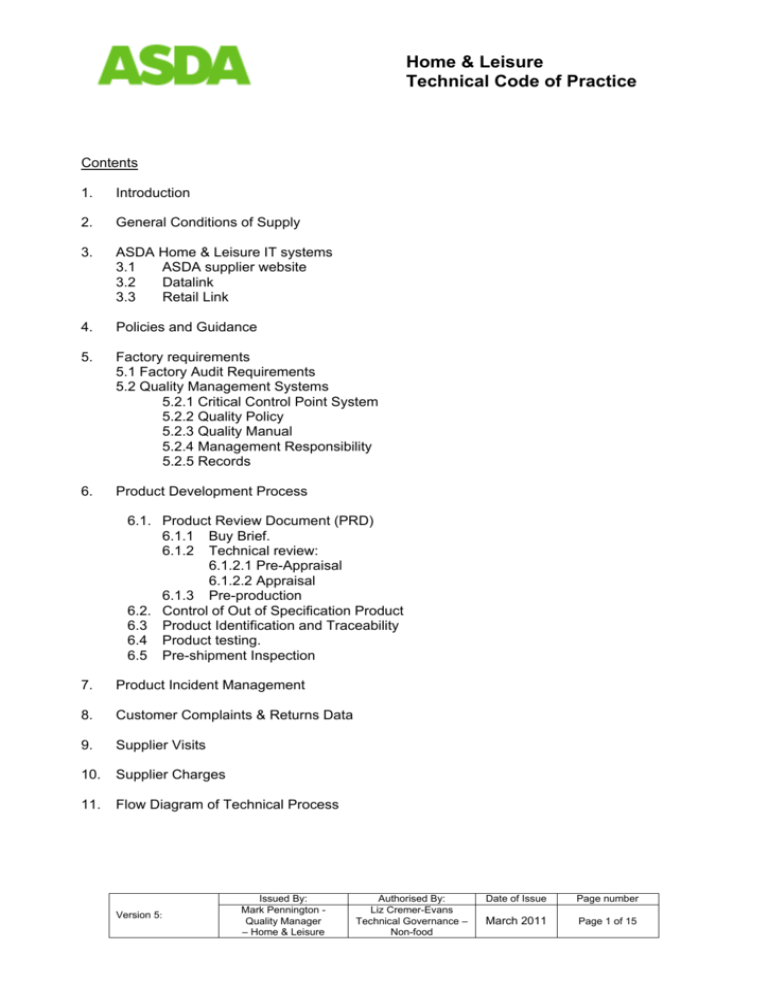
Home & Leisure Technical Code of Practice Contents 1. Introduction 2. General Conditions of Supply 3. ASDA Home & Leisure IT systems 3.1 ASDA supplier website 3.2 Datalink 3.3 Retail Link 4. Policies and Guidance 5. Factory requirements 5.1 Factory Audit Requirements 5.2 Quality Management Systems 5.2.1 Critical Control Point System 5.2.2 Quality Policy 5.2.3 Quality Manual 5.2.4 Management Responsibility 5.2.5 Records 6. Product Development Process 6.1. Product Review Document (PRD) 6.1.1 Buy Brief. 6.1.2 Technical review: 6.1.2.1 Pre-Appraisal 6.1.2.2 Appraisal 6.1.3 Pre-production 6.2. Control of Out of Specification Product 6.3 Product Identification and Traceability 6.4 Product testing. 6.5 Pre-shipment Inspection 7. Product Incident Management 8. Customer Complaints & Returns Data 9. Supplier Visits 10. Supplier Charges 11. Flow Diagram of Technical Process Version 5: Issued By: Mark Pennington Quality Manager – Home & Leisure Authorised By: Liz Cremer-Evans Technical Governance – Non-food Date of Issue Page number March 2011 Page 1 of 15 Home & Leisure Technical Code of Practice 1. INTRODUCTION This Code of Practice (COP) covers all ASDA Brand own label, direct imports, tertiary brand or any other exclusive to ASDA Home & Leisure products. It outlines the contractual obligations for the supply of products into ASDA, supporting the terms and conditions. ASDA will only purchase products from approved suppliers who can demonstrate due diligence covering key items: • • • • Product development, taking into account safety, legality and quality. A specification to define key materials, designs, measurements and other parameters to allow consistent achievement of the product and packaging. Testing and certification tailored to ensure the specification and all legal requirements are met. A factory manufacturing base capable of producing the product consistently to be safe, legal and of agreed quality. Approved suppliers must demonstrate good manufacturing practices and meet the requirements laid down by specifications and all relevant legislation. Due regard must be given to environmental and ethical concerns. This Code of Practice document • • • Must be read in conjunction with relevant ASDA supplier Terms and Conditions. Must be read in conjunction with relevant ASDA Policy Statements Must be read in conjunction with the product specification agreed between ASDA and the supplier. Suppliers must visit the ASDA supplier website regularly to ensure they are kept up to date with current policy and requirements. This Code of Practice is in addition to any legal obligations in relation to the products supplied. This document is not exhaustive, and expert advice must be sought where appropriate. Where a particular issue is not covered within this code of practice, the supplier must default to legal compliance or recognised industry best practice. It is the supplier’s responsibility to communicate the ASDA code of practice, policies and technical manual through their supply chain to ensure compliance. Whilst this document lists all steps involved within the ASDA product development process, certain products may not be required to follow all steps. Confirmation will be given by the ASDA technical team. Version 5: Issued By: Mark Pennington Quality Manager – Home & Leisure Authorised By: Liz Cremer-Evans Technical Governance – Non-food Date of Issue Page number March 2011 Page 2 of 15 Home & Leisure Technical Code of Practice 2. GENERAL CONDITIONS OF SUPPLY Product sold in ASDA stores must at all times be safe and legal and consistently meet the quality standards agreed in writing with the supplier. All products, including its associated packaging, supplied to ASDA must fully comply with all current and relevant United Kingdom (UK) and European Union (EU) legislation, regulations and quality standards, including, where applicable, recognised industry Codes of Practice. All products supplied to ASDA must fully comply with a written specification agreed with the relevant ASDA Technical Contact. ASDA reserves the right to reject any products failing to meet any requirement of the approved specification. The level of product development the ASDA technical team will undertake for tertiary brand products will be dependant on the supplier categorisation the ASDA technologist will confirm all requirements. Version 5: Issued By: Mark Pennington Quality Manager – Home & Leisure Authorised By: Liz Cremer-Evans Technical Governance – Non-food Date of Issue Page number March 2011 Page 3 of 15 Home & Leisure Technical Code of Practice 3. ASDA HOME AND LEISURE IT SYSTEMS 3.1 ASDA Supplier Website: ASDA publishes its policies on the ASDA supplier website, along with a copy of ASDA’s terms and Conditions of supply. The website is free to access through the below weblink:www.asdasupplier.com ASDA regularly update documents placed upon the website, therefore it is essential that all suppliers frequently access the information and ensure that they are familiar and up-todate with all relevant ASDA’s policies and Terms and Conditions. 3.2 Datalink Datalink is the on-line library of test reports from ASDA’s 3rd party laboratory partner ITS. The results of all items submitted by a specific supplier to ITS for testing will appear on Datalink, with a copy of the test report (in a .PDF format) available to view for each supplier. Datalink will also provide a status summary of testing in progress. Testing certificates approved by the H&L technical team from other approved laboratories must be uploaded by the laboratory. Please note that whilst each supplier will only be able to access their own product test details, ASDA will have access rights to view all ASDA product specific test reports on Datalink. 3.3 Retail Link All approved suppliers will be given access to the Wal-Mart/ASDA system, Retail Link. Retail link is predominantly a trading system; however it is used by the technical teams to monitor product returns, by total amount and by defective returns. Returns reports are sent to suppliers for them to monitor and investigate as necessary. Each category technologist will monitor and send out additional information collated from returns data for supplier investigation. All suppliers are also expected to monitor this data regularly. Version 5: Issued By: Mark Pennington Quality Manager – Home & Leisure Authorised By: Liz Cremer-Evans Technical Governance – Non-food Date of Issue Page number March 2011 Page 4 of 15 Home & Leisure Technical Code of Practice 4. POLICIES AND GUIDELINES ASDA has published its terms and conditions and policies on the supplier website.. ASDA policies detail the frame work and standards with which our suppliers must comply, and which provide guidance on completion of specifications and other documentation. . Product technical requirements (Make standards) and appraisal information in a Product Review Document (PRD) and product Testing Schedules are available on the supplier website and will be confirmed by the relevant ASDA technologist for each specific product. These will form part of the communication between ASDA and its suppliers by product. ASDA expects all suppliers and agents to read the content of these documents and implement accordingly. Suppliers and agents must also be able to demonstrate how they have implemented the policy. 5. FACTORY REQUIREMENTS 5.1 Factory Audit Requirements As a minimum, suppliers must be approved to ASDA’s Ethical Standards and Factory Capability and Capacity Audit (FCCA) via approved third party audit process. Factory prequalification audits will be required prior to order commitment for new factories of all ASDA own label and exclusive to ASDA product suppliers. The suppliers should disclose all the sites via the Retail link system & follow the Asda Wal-Mart Ethical Standards and FCCA Audit programme. In order to fully and correctly complete the process, it is vital that the supplier discloses all manufacturing and sub-contract factories to ASDA. Factory Capability and Capacity Audit (FCCA): The purpose of the FCCA audit is to assess a new factory prior to building a business relationship. Ensuring that they have the correct procedures and policies in-place, and these are fully implemented across relevant areas of the business, from goods-in to preshipment inspections. It will also look at the quality management system within the factory and quality control checks. Ethical Standards The purpose of the Ethical Standards Audit is to verify that within the factory (and/or subcontract factory where applicable) all labour is voluntary, that children are not used in the production of merchandise for Wal-Mart/ASDA, and that workers are properly paid for all hours worked and that those hours are not excessive and are consistent with local laws or regulations. We will also require that factories respect the rights of workers to associate, to provide for safe and healthy working conditions and, where applicable, to provide workers with safe and healthy residential facilities. All suppliers should follow the supplier standards stated. The ethical audit will be based on these standards. Version 5: Issued By: Mark Pennington Quality Manager – Home & Leisure Authorised By: Liz Cremer-Evans Technical Governance – Non-food Date of Issue Page number March 2011 Page 5 of 15 Home & Leisure Technical Code of Practice The management and communication of this process is undertaken by the ASDA Global and Ethical sourcing teams 5.2. Factory Quality Management Systems ASDA expects that supplier Quality Management Systems are robust, appropriate to the product produced and effective in ensuring that only products meeting ASDA’s requirements reach its customers. 5.2.1. Critical Control Point System Using the Hazard Analysis Critical Control Point (HACCP) system as a guide, suppliers should ensure that they have considered all critical areas of production and assembly and that they have suitable checks in place to ensure the correct procedures are used at all times. Documented risk assessments and studies must be produced and released to ASDA upon request. ASDA expects its suppliers to be able to demonstrate that the principles of this approach is a way of working within their business, and that it is equally understood and respected by all members of the manufacturing and management teams Suppliers must be able to demonstrate that appropriate principles and studies have been carried out by a multidisciplinary team and that the team leader has been adequately trained. Principles of HACCP studies should be based on the following process:• Process flow diagrams drawn for each process. • Potential hazards, associated with each process step, identified and documented. • A decision tree used to define the Critical Control Points (C.C.P.). • The control target levels and tolerances must be defined in order to ensure that each C.C.P. is controlled. • This must be verified by a suitable monitoring system with documented work instructions. • Corrective action must be documented in order to define the action required when the C.C.P. is moving out of control. • Verification procedures must be implemented to confirm the effectiveness of the system, with corrective action taken as appropriate. Version 5: Issued By: Mark Pennington Quality Manager – Home & Leisure Authorised By: Liz Cremer-Evans Technical Governance – Non-food Date of Issue Page number March 2011 Page 6 of 15 Home & Leisure Technical Code of Practice 5.2.2. Quality Policy Suppliers to ASDA must have a clearly defined and documented Quality Statement which is underwritten by a senior member of the company management. The policy must state the company’s intention to meet its obligations to produce safe, legal and quality products in line with ASDA’s expectations. The policy must be regularly reviewed, at least annually. 5.2.3. Quality Manual The quality system should be documented in a quality manual, with a procedure in place to ensure that an effective document control process is in place. The quality manual should be made available to all key personnel, with appropriate training given as necessary. Training records should be available for all key personnel. Documented procedures should outline the methods of working and include corrective actions. 5.2.4. Management and Responsibility It is the responsibility of the supplier management to clearly identify the company management structure, defining reporting relationships and job responsibilities. To ensure the quality, safety, legality and environmental best practice in the production of ASDA products, and to establish and meet the training needs of all personnel. Personnel must be trained with reference to documented procedures, full training records should be maintained and reviewed. Temporary personnel and contractors must be trained as appropriate, prior to commencing work. There should be commitment from senior management that quality objectives are established and maintained. 5.2.5. Records All production records must be legible and genuine and kept for a minimum of 10 years in order to demonstrate due diligence. These records may be required for inspection by ASDA or Local Authority Inspectors. Version 5: Issued By: Mark Pennington Quality Manager – Home & Leisure Authorised By: Liz Cremer-Evans Technical Governance – Non-food Date of Issue Page number March 2011 Page 7 of 15 Home & Leisure Technical Code of Practice 6. PRODUCT DEVELOPMENT PROCESS All products sold in ASDA stores must meet a high standard of safety, quality, legality and durability. This minimum standard is assured through a process of product assessment throughout the development of the product. The product development process is intended to ensure that: • • • The product is manufactured to meet ASDA’s requirements. That the manufacturer applies appropriate controls throughout production to ensure that the ASDA make standard is consistently maintained That the supplier agrees a technical specification with ASDA. This section gives an introduction to the product approval process and ASDA’s expectations for suppliers within that process. For ASDA’s packaging development process, please refer to the packaging policy, available from the Packaging team. 6.1 Product Review Document (PRD) ASDA holds a technical file for each product, which consists of a Product Review Document (PRD). The PRD details the following: • • • • • • • Buy Brief Pre- Appraisal Product specification Technical product review / hazard assessment comments Bill of Materials Pre-production requirements Appraisal All Suppliers, in conjunction with ASDA, must complete an accurate specification which forms part of the PRD (Product Review Document). The specification must be current and cannot be changed without prior written approval from the ASDA technical team 6.1.1 Buy Brief The buy brief is completed and agreed by the category trading team and technical team. The brief details what we want to buy and will include: • Estimated quantities • General product requirements • Packaging and labelling (It is a requirement that the supplier comply with the ASDA Packaging policy. For further details, please contact the Packaging team) • Make standards • Testing requirements • Pre-shipment Inspection Requirements Version 5: Issued By: Mark Pennington Quality Manager – Home & Leisure Authorised By: Liz Cremer-Evans Technical Governance – Non-food Date of Issue Page number March 2011 Page 8 of 15 Home & Leisure Technical Code of Practice 6.1.2 Technical review 6.1.2.1 Pre-Appraisal The pre-appraisal review is conducted by the ASDA technical team on the selection sample, from a confirmed factory, and concentrates on: • • • • • The construction of the product General safety requirements Fitness for purpose Risk assessment Compliance data, WEEE, batteries, Reach etc. The review will confirm: • the product specification and any product amendments required • the number of additional modified samples needed for further checks. (All samples submitted must be clearly labelled and include the appraisal stage, amendment number and sample date.) Recommended pack copy and instructions will be advised at this stage. The sealed product route (the product approval stages) will be confirmed by the technologist at the end of this stage and details given on the number of further samples required. If an additional appraisal is required it is usual for 3 correctly amended samples to be required. If a Pre-production review is required the number of samples will vary depending on the nature of the item, but will be indicative of production. If additional samples are required, the supplier must ensure that they are clearly labelled and include the appraisal stage, amendment number and sample date. 6.1.2.2 Appraisal The appraisal review is conducted on samples amended in accordance with the preappraisal findings. Similar to the pre-appraisal process, the appraisal will review: • • • The construction of the product, instructions, care & use information General safety requirements Fitness for purpose. The review will re-confirm the product specification and advise if any further product amendments or appraisal reviews are required. Version 5: Issued By: Mark Pennington Quality Manager – Home & Leisure Authorised By: Liz Cremer-Evans Technical Governance – Non-food Date of Issue Page number March 2011 Page 9 of 15 Home & Leisure Technical Code of Practice If additional samples are required, the supplier must ensure that they are clearly labelled and include the appraisal stage, amendment number and sample date. For certain products highlighted during the review process it may be necessary to carry out additional requirements such as: • • In-line process Surveillance testing This will be confirmed by the ASDA technical team. 6.1.3 Pre-production The pre-production review is conducted on samples amended as agreed during the previous approval stages. The pre-production samples must be representative of bulk production. At this stage, the technical team and supplier will agree any relevant manufacturing tolerances. The technologist may visit the factory or arrange a meeting with the supplier & factory manager to carry out a pre-production meeting. The pre-production review will look at: • • • • The manufacturing process flow Agree manufacturing tolerances Review the manufacturing process controls checks and agree specific control test frequency Agree any product instructions For products highlighted during the review process as high risk it may be necessary to carry out additional requirements such as: • • In-line process Surveillance testing This will be confirmed by the ASDA technical team. Version 5: Issued By: Mark Pennington Quality Manager – Home & Leisure Authorised By: Liz Cremer-Evans Technical Governance – Non-food Date of Issue Page number March 2011 Page 10 of 15 Home & Leisure Technical Code of Practice 6.2 Control of Out of Specification Material/ Product Where an incoming material / component or the finished product is found to be out of specification it must be isolated and labelled. It must then be destroyed, returned to the vendor or reworked as agreed with the ASDA technical team. The supplier must initiate an investigation and feedback the causes for the out-of-specification. No out-of-specification product is to be released for distribution to ASDA without the authority of the relevant ASDA Technical Contact. 6.3. Product Identification and Traceability An effective traceability system is reliant upon the co-ordination and integration of data/information from multiple sources over a short timeline. ASDA requires all products advised by the technologist, to be batch coded and must include full traceability of raw material as well as finished product. The traceability system must be regularly challenged (minimum frequency annually) for accuracy and speed of response. ASDA reserves the right to test these response times. As a minimum, ASDA expects traceability of products back to the day of production and assembly line. 6.4. Product Testing Testing must be carried out by a UKAS / HOKLAS / ILAC accredited laboratories. ASDA’s key laboratory partner is ITS, however test reports from the following will be accepted: • • • • • • BV (Electrical, Textiles, Toys) CERAM (Ceramics & Glass) KEMA (Christmas lights , SDA) CATRA (Metal) FIRA (Furniture) CERTOTTICA (Optical) In exceptional circumstances test reports from other accredited laboratories will be accepted with prior agreement by the ASDA technical team in the UK. A document review will be required in this instance. Test reports are valid for one year from the date of testing and must be re-tested so the reports run back to back. In addition to the routine testing carried out by the manufacturer, ASDA reserves the right to independently test random products. If the product conforms to specification, the costs associated with this additional testing shall be met by ASDA. In the event of non-conformance the cost will be carried by the supplier. Version 5: Issued By: Mark Pennington Quality Manager – Home & Leisure Authorised By: Liz Cremer-Evans Technical Governance – Non-food Date of Issue Page number March 2011 Page 11 of 15 Home & Leisure Technical Code of Practice 6.5 Pre-shipment Inspection An independent 3rd party inspection is required for all FOB purchase orders to confirm that production conforms fully to ASDA’s product specification. This inspection will be conducted using ASDA’s Pre-shipment Inspection requirements. It is the supplier’s responsibility to contact the inspection company to arrange a preshipment inspection approximately 7 days prior to 100% production complete. 90% must be packed at the time of inspection and an approved production sample must be available for inspection. Any issues found by the inspection company will be advised to ASDA. Products will not be allowed to ship unless agreed by the ASDA technical team. Any inspections which abort will become the responsibility of the supplier to rebook. Any relevant costs will be carried by the supplier. Version 5: Issued By: Mark Pennington Quality Manager – Home & Leisure Authorised By: Liz Cremer-Evans Technical Governance – Non-food Date of Issue Page number March 2011 Page 12 of 15 Home & Leisure Technical Code of Practice 7. PRODUCT INCIDENT MANAGEMENT The supplier is responsible for ensuring there is a procedure in place to notify ASDA of the occurrence of an incident that renders ASDA product unsafe, illegal or of substandard quality. Alternatively if an incident is highlighted as a result of a customer complaint, a procedure must be in place to enable thorough and timely investigation. Please refer to ASDA’s Product Incident policy for full details. 8. CUSTOMER COMPLAINTS & RETURNS DATA Complaints received by ASDA will be co-coordinated by the ASDA Customer contact centre logged onto the ASDA complaints system and then sent to suppliers on a weekly basis by ASDA Technical Teams. All suppliers must have a written policy which sets out the procedures to be followed in the event of any customer complaints. This must also indicate the specific person responsible for handling complaints. Suppliers must collect and analyse all complaint data, by product, complaint, category and source. The outcome of all customer complaint investigations must be clearly documented. Any trends must be identified, reacted to accordingly and communicated to the ASDA Technical Team. ASDA does not expect suppliers of ASDA brand product to have direct contact with complainants. The supplier is expected to thoroughly investigate complaints, provide all the relevant documentation, implement any corrective actions and summarise their findings to the ASDA Contact Centre who will then co-ordinate a response to the customer. This is expected to be carried out in a timely manner and to meet all requirements of the ASDA Contact Centre. Outcomes of complaint investigations must be used to improve quality and safety. If a complaint requires further analysis then the supplier may be required to settle the additional costs. Version 5: Issued By: Mark Pennington Quality Manager – Home & Leisure Authorised By: Liz Cremer-Evans Technical Governance – Non-food Date of Issue Page number March 2011 Page 13 of 15 Home & Leisure Technical Code of Practice 9. SUPPLIER VISITS ASDA reserves the right to visit suppliers in order to effectively and independently validate operations. Visits may be announced or unannounced as circumstances require. Suppliers must ensure that : • Open access to the site and all relevant documentation is made available • Relevant people at the necessary seniority are available to escort ASDA colleagues around the site allowing appropriate access to the operation, ensuring their safety and answer any questions. • Visits may be: -Routine (e.g. to inspect products and facilities against specification, exchange information) -New Product Development (e.g. to evaluate suitability of new products / processes, pre-production trials, product launches) -Reactive (e.g. a trouble-shooting visit in response to declining sales, escalating complaints or product withdrawal / recall). 10. SUPPLIER CHARGES ASDA reserves the right to recover the costs of lost sales and additional administration resulting from the supply of any goods failing to meet specification or the terms of the jointly agreed supplier warranty, as detailed in terms and conditions. Version 5: Issued By: Mark Pennington Quality Manager – Home & Leisure Authorised By: Liz Cremer-Evans Technical Governance – Non-food Date of Issue Page number March 2011 Page 14 of 15 Home & Leisure Technical Code of Practice 11. FLOW DIAGRAM OF TECHNICAL PROCESS This diagram outlines the full process including some sourcing stages. Version 5: Issued By: Mark Pennington Quality Manager – Home & Leisure Authorised By: Liz Cremer-Evans Technical Governance – Non-food Date of Issue Page number March 2011 Page 15 of 15
